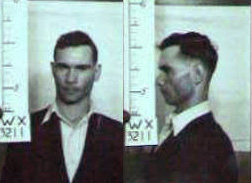Francis Malarkey
From Our Contribution
 | |
| Personal Information | |
|---|---|
| Date of Birth | 5 Nov 1913 |
| Place of Birth | Narrogin, Western Australia |
| Age at Enlistment | 27 years, 4 months |
| Occupation | Market gardener |
| Religion | Roman Catholic |
| Address | PO Byford, Western Australia |
| Next of Kin | Father , Mr Henry William Malarkey |
| Military Information | |
| Reg Number | WX3211 |
| Date of Enlistment | 22 May 1940 |
| Rank | Private |
| Unit/Formation | 2nd/16th Australian Infantry Battalion |
| Date of Embarkation | 25 Oct 1940 ‒ 25 Nov 1940 |
| Ship Embarked On | HMT Aquitania Fremantle to Egypt |
| Date of Embarkation | 6 Aug 1942 ‒ 13 Aug 1942 |
| Ship Embarked On | SS James Fenimore Cooper Townsville to Port Moresby |
| Date of Return | 29 Jan 1942 ‒ 25 Feb 1942 |
| Ship Returned On | SS Île de France & SS Kosciusko Egypt to Addu Atoll to Adelaide |
| Date of Return | 20 Dec 1942 |
| Ship Returned On | plane Port Moresby to Townsville |
| Fate |
Returned to Australia Medical discharge |
| Medals |
1939-45 Star Africa Star Pacific Star Defence Medal War Medal 193-45 Australian Services Medal 1939-45 |
Pre War
War Service
Enlisted 22 May 1940 and immediately identified for the 2nd/16th Battalion. Granted 8 days leave without pay, he was taken on strength on 30 May in Northam. From 24 Jun until 1 Jul 1940 he needed treatment at the Northam military hospital. In need of hospital from 21 - 29 Aug 1940 with influenza, before being granted sick leave at home from 3-11 Sep 1940. From 27 Sep until 4 Oct 1940 he was granted pre-embarkation leave, and on 25 Oct 1940 the battalion boarded HMT Aquitania for the Middle East where they disembarked in 25 Nov 1940.
The battalion undertook defensive duties along the Egyptian–Libyan border in early 1941 before taking part in the Syria–Lebanon campaign, fighting against Vichy French forces in June and July. At the conclusion of the campaign, the 2/16th remained in Lebanon, contributing to the Allied occupation force there. However, with Japan's entry into the war, they were to return to Australia, and on 29 Jan 1942 Francis boarded the SS Île de France which was a part of the Operation Pamphlet Convoy. On the way home records show that men were transhipped in Bombay. However an authoritive source "Across the Sea to War" by Peter Plowman describes the convoy as sailing well to the south of India to the Addu Atoll, the southernmost of the Maldive Islands, known as Port T, a secret port not known to the Japanese. It would have been here that Francis and his colleagues transferred on 11 Feb 1942 to the SS Kosciusko which disembarked in Adelaide on 23 Mar 1942. While on the "Kosciusko" Francis was on 3 Mar 1942 charged with Neglect to the prejudice of good order and military discipline, for which he was awarded 4 days CB (extra duties).
Soon after arrival in South Australia, the battalion was sent to Queensland to prepare for a move to Papua New Guinea, and on 6 Aug 1942 they embarked in Brisbane on the SS James Fenimore Cooper for Port Moresby, arriving there on 13 Aug 1942. They were quickly sent up the Kokoda Track to assist militia troops then being driven back by the Japanese advance. Francis seems to have been one of the small number of 2nd/16th Battalion men to come through their time on the track without major injury. On 1 Oct 1942 he was evacuated to the 46th Camp Hospital with a chronic cough, and then admitted to the 2nd/9th Australian General Hospital with synovitis. He was returned to the battalion on 11 Oct 1942 in time to participate in the attacks on Japanese positions at Buna and Gona.
Soon after on 14 Dec 1942 he was again evacuated to the 2nd/9th Australian General Hospital, this time with asthma, and on 20 Dec 1942 he was evacuated by plane to the 2nd/14th Australian General Hospital in Townsville. Two days later he was transferred by Ambulance Train to the 2nd/11th Australian General Hospital in Warwick, inland from Brisbane. On 14 Jan 1943 he was released from hospital to the 102nd Australian Convalescent Depot in the same town. Next he was sent to the Ascot Staging Camp for forwarding to WA on leave for 14 days, entraining at Claremont on 5 Mar 1943 to return to Queensland where he rejoined his battalion on 20 Mar 1943 where they were rebuilding on the Atherton tablelands.
The battalion embarked in Townsville on the SS Canberra on 2 Aug 1943 for Port Moresby, arriving there on 5 Aug 1943. A month later a Medical Board in New Guinea approved his movement to WA for a Final Medical Board, with their recommendation that he was "Medically unfit for Military Service". On 28 Oct 1943 he was assessed by a Medical Board at Hollywood as "D" Unfit due to Asthma and Bronchitis, and was discharged on 19 Dec 1943.
Post War
Notes